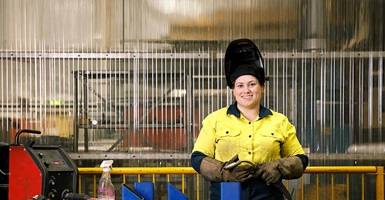If you’re a caring person who wants to make a difference in the lives of others, you could find meaningful and rewarding opportunities providing services to people with disabilities.
Disability support workers provide life-changing support and care that can empower people with disabilities to take maximum control of their own lives.
Around 4.3 million Australians have a disability and the National Disability Insurance Scheme (NDIS) allows around 500,000 Australians under 65 years, who have permanent and significant disability, to access funding and support services.
Support workers are needed to provide various services including household assistance, emotional support, care and companionship.
Here’s what you need to know about a career in disability services:
What attributes do you need?
Chisholm Institute disability NDIS trainer Carolyn Duffey says to work in disability you’ll need to be committed to your job and willing to work with people who have various challenges.
“You need to be able to work efficiently, be reliable, be empathetic and be a really good listener, in order to support and empower them to live the life they design,” Carolyn says.
What type of work does disability care involve?
The type of work is varied and may include helping with personal tasks such as washing, dressing and feeding. Domestic chores such as cleaning, cooking, washing and ironing might also be on your list.
You could also be responsible for implementing and delivering care programs for people in residential facilities, or simply providing companionship. You’ll also be required to work with a team of health professionals, family, friends and carers.
Disability support workers can work in private homes or in community facilities. Work hours can include evenings, weekends and public holidays.
What are the challenges?
Carolyn says like all jobs, working in the disability services sector does have its challenges.
“Sometimes you’ll need to work with people who have complex medical needs, or be at risk of poor mental health as well, which can be difficult,” she says.
“There is also the chance that some clients may exhibit behaviours that can put you at risk.”
Disability courses and career pathways
With a growing need for disability services workers, there are many career paths available. A will give you the skills and knowledge required to work as a disability worker, community care worker, field officer, care assistant, personal carer or accommodation support worker.
A Certificate IV in Disability (CHC43115) can lead to positions such as integration aid, residential care officer, adult training services worker or disability support officer.
These courses have both been included in the Victorian Government’s Free TAFE for Priority Courses program, which reduces the financial barrier for students wanting to train in courses that lead to jobs in demand from Victorian employers.
Both these courses can lead to further training including a Diploma of Community Services (CHC52015). By gaining your qualifications in the disability sector, you can end up working in a range of industries including mental health, justice, youth services, education, and even allied health.
Chisholm also offers the two week Course in Introduction to the National Disability Insurance Scheme (22469VIC) for those who want to learn more about the NDIS, or want a pathway to further qualifications.


